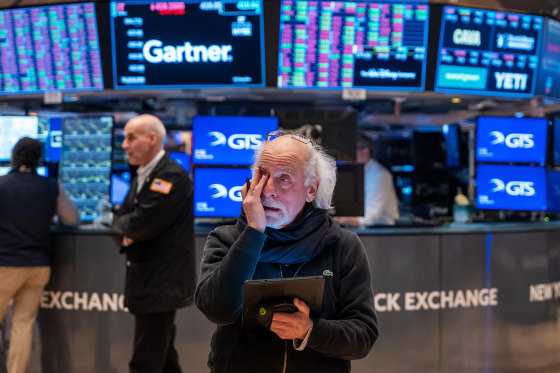
Stocks Slide as Investors Brace for 'Liberation Day' Tariff Announcement
Wall Street took a hard hit as trading opened on Monday, with major indexes plunging as investors grew anxious ahead of President Donald Trump’s highly anticipated 'Liberation Day' tariff announcement set for Wednesday. The markets reacted swiftly, with the S&P 500 dropping 1.3%, the Nasdaq sliding 2.3%, and the Dow Jones Industrial Average dipping 0.7%.
Reports over the weekend indicated that while Trump was still finalizing the details of his global trade duties, he was leaning toward an aggressive approach, potentially impacting most U.S. trading partners. On Sunday, the president confirmed aboard Air Force One that the tariffs would apply to "all countries," sending further shockwaves through the financial world.
This turmoil comes on the heels of an already turbulent market performance last Friday, when investors wrestled with concerning inflation data and weakening consumer confidence. With growing fears of an economic slowdown—especially in artificial intelligence investments—stocks suffered their second-worst day of the year. The S&P 500 has now lost about 5% of its value in 2024 and is down approximately 6% since Trump’s re-election in November. The Nasdaq has performed even worse, slipping 10% year-to-date and 9% since the election.
Also Read:- Emergency Alert Shakes Detroit Amid Possible Explosion at 13910 Littlefield
- Lady Gaga's UK Tour 2025 Sparks Controversy Over 'Insane' Ticket Prices
Unlike his first term, Trump appears less concerned about investor reactions. Despite significant pushback from the business community, he has remained steadfast in his protectionist stance. When questioned about potential price increases for automakers due to tariffs, Trump dismissed the concern, stating he "couldn't care less." He also downplayed warnings about stagflation—an economic scenario characterized by high inflation and slow growth—insisting that the U.S. is heading toward a period of booming prosperity.
Economists, however, see a different picture. A recent CNBC survey of 14 economists now forecasts that first-quarter GDP growth will slow to just 0.3%, down sharply from 2.4% in the same period last year. Goldman Sachs has also revised its projections, lowering expected annual GDP growth from 2% to 1.5% and increasing the odds of a recession from 20% to 35%. The investment firm cited growing concerns about weaker business and consumer confidence, coupled with indications that the administration is willing to tolerate short-term economic pain for its policy goals.
Additionally, Goldman Sachs has downgraded its outlook for corporate earnings, expecting higher tariffs and sluggish economic growth to weigh on profitability. The bank now sees the S&P 500 ending the year at around 5,700—just marginally above current levels. Deutsche Bank economists warn that if Trump follows through with his aggressive tariff plans, the U.S. will see its highest tariff rates since World War II.
Despite these warnings, the administration appears undeterred. Over the weekend, Vice President JD Vance echoed Trump’s rhetoric, declaring that the U.S. was no longer the world's "piggy bank" and inaccurately claiming that middle-class wages had declined. He assured supporters that the days of closed factories and struggling workers were over, reinforcing the administration’s firm stance on trade policies.
As Wednesday’s announcement looms, Wall Street remains on edge, bracing for the potential fallout from a sweeping tariff policy that could reshape the global economic landscape. Investors are watching closely, knowing that the next few days could define the trajectory of the markets for the rest of the year.
Read More:



0 Comments